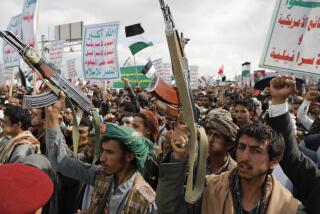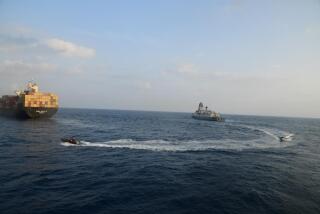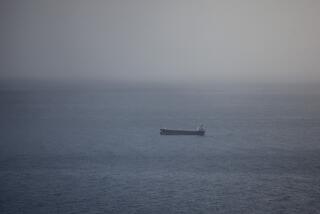Rebels Reportedly Trap S. Yemen Troops
DJIBOUTI â South Yemen rebel forces, battling from house to house, have captured Adenâs foreign embassy quarter and trapped head of state Ali Nasser Hasaniâs beleaguered troops in the old section of the capital, according to reports emerging from Aden on Thursday.
The fierce fighting, which is said to have devastated Aden and claimed as many as 12,000 lives, âis now all but over,â said Cmdr. Richard Bridges, captain of the frigate Jupiter, one of the British vessels evacuating foreigners from the embattled capital.
Bridges, speaking to reporters when the Jupiter arrived in Djibouti early Thursday, said that fighting in Khormaksar, Adenâs northeastern embassy quarter, had tapered off Wednesday. He said clashes continued âsporadicallyâ in only the old, southernmost quarter of the city known as the Crater, where the last Hasani loyalists were holding out.
Bridgesâ account, along with reports from refugees arriving in Djibouti later in the day, appeared to indicate that the rebels have all but crushed Hasaniâs forces after 11 days of civil war.
Rebels May Be Divided
However, the rebels were themselves said to be divided between forces loyal to former head of state Abdul-Fattah Ismail and Deputy Prime Minister Ali Ahmed Antar. It was not clear which faction would come out on top, and diplomats in Djibouti, 200 miles from Aden across the Red Sea, predicted that the fighting may resume between the rebel factions once Hasaniâs forces have been eliminated from their last stronghold in the Crater district.
The fall to rebel forces of Khormaksar, which pushed the line of battle southward into the old city, allowed several hundred foreigners trapped near the French and Soviet embassies to finally be evacuated by British, French and Soviet ships.
Officials in Djibouti said about 2,500 foreigners were plucked from two coastal evacuation sites Wednesday night and Thursday morning. They included more than 1,000 Soviets, part of the substantial Soviet presence in South Yemen, the only Marxist state in the Middle East.
Their departure brought the number of foreigners evacuated from South Yemen over the last week to more than 7,000, including nearly 5,000 Soviets. A large group of Indian nationals, said to number about 850, were still awaiting evacuation, while an undisclosed number of Soviets were staying behind despite heavy damage to the Soviet Embassy.
Bodies in Adenâs Streets
Refugees who arrived here Thursday said the streets of Aden were strewn with bloated bodies and debris. The British, French and Soviet embassies were all heavily damaged by shellfire. Bridges said that during the height of the fighting in Khormaksar on Tuesday, the Soviet Embassy âhad its top story blown off.â
Arab news reports in the Persian Gulf said that 18 Soviet military advisers have been killed. British officials said they could not confirm this but that they knew there have been âcasualtiesâ at the Soviet Embassy.
The refugees told tales of hardship and suffering, of sleepless days and nights without food, water or electricity, indiscriminate shelling and fierce house-to-house fighting.
A group of Indian evacuees said that when their bottled water ran out several days ago, they sneaked outside during a lull in the fighting to collect salt water, then mixed it with sugar to make it potable. Those trapped inside the British Embassy were more fortunate. When their water ran out, they drank and bathed in the embassyâs stock of French champagne, British Ambassador Arthur Marshall said.
âWorse Than World War IIâ
âIt was worse than World War II,â said Joan Reeves of Southhampton, England. âThen you knew who the enemy was, but in Aden you never knew who was who and what would happen next.â
Grant Perry, a pipeline construction worker stationed at a camp north of Aden, said that when the fighting began, rebel army units and tribesmen poured down on the capital from the hills adjoining the city. âThey came from the north in droves,â said Perry, who added that the âsky over Aden glowed brightly for five nights from the fires ignited by incoming artillery shells.â
Aden radio, now in rebel hands, said the situation was âreturning to normalâ in the capital and that the airport, scene of heavy fighting earlier in the week, would be reopened today. However, diplomats said they suspected the radio was falsifying some of its reports in order to give the impression that the rebels were firmly in control of the country.
The Soviet Union, which seems to have failed to anticipate the fighting, has tried but failed to negotiate a cease-fire. It has said that it will not provide either side with munitions and has appealed to Yemen and Oman not to resupply Hasaniâs forces. Diplomats said the Soviets seem to hope that they will be able to reassert control once both sides run out of ammunition.
Royal Navyâs Role Ends
Although accounts from the refugees indicated that some foreigners were still left in the city, British officials said that the Royal Navyâs role in the evacuation was over.
More to Read
Sign up for Essential California
The most important California stories and recommendations in your inbox every morning.
You may occasionally receive promotional content from the Los Angeles Times.










